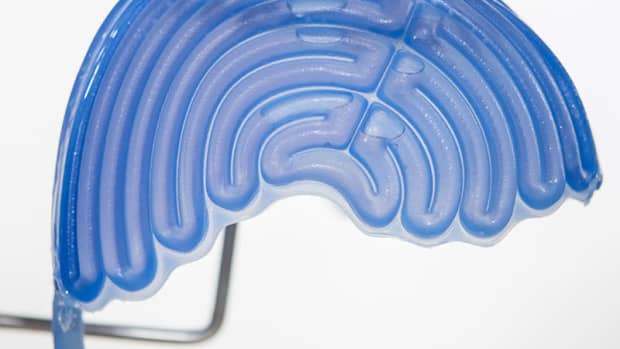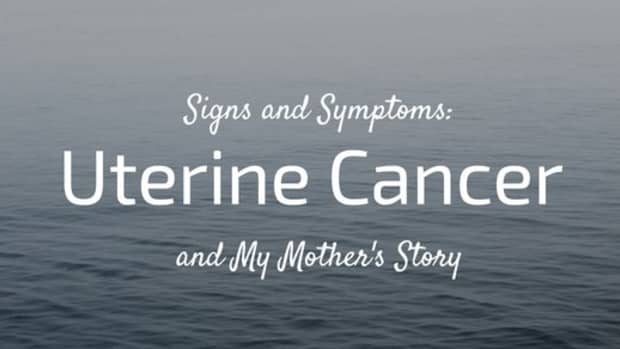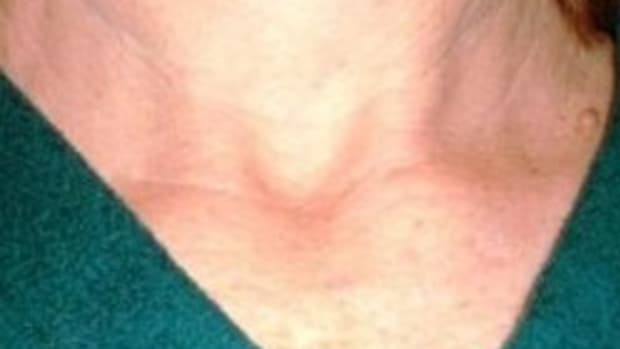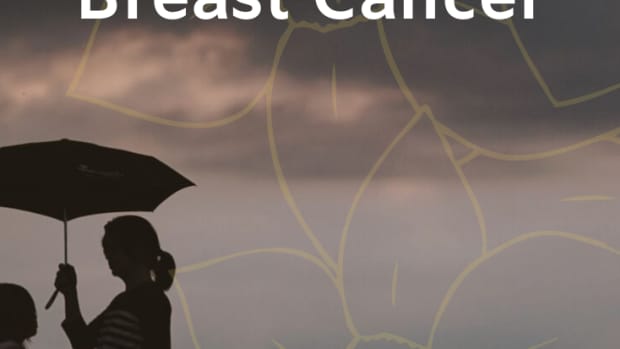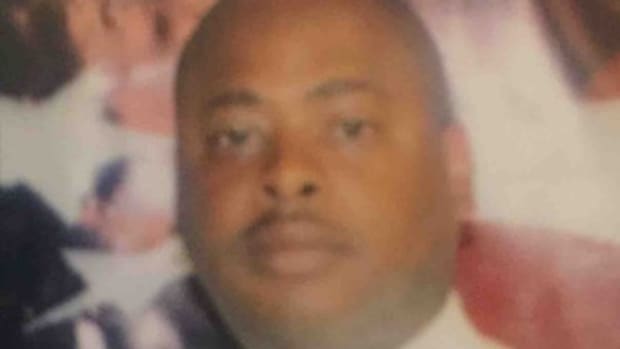My Sister Had Bone Cancer: What I Learned About It
When Bone Cancer Struck My Sister
Cancer of the bones is not very common. The American Cancer Society estimates that only about 3,110 people are diagnosed with this type of cancer each year. However, when a loved one receives this diagnosis, the low statistics don't mean much.
My big sister, Kim, was the light of my life—my best friend. We affectionately called each other "Sister." In 2006, we discovered she had bone cancer. It came as a big shock to all of us, but looking back, there were some warning signs. They just weren't anything we thought of as significant at the time.
The symptoms of bone cancer often go undetected. I hope that by reading this article you will become more informed about the symptoms and treatments for this cancer.
Common Symptoms of Bone Cancer
- Pain
- Swelling
- Fatigue
- Bone breakage with little to no trauma
Advanced Stages
- Fever
- Chills
- Weight Loss
One of the main symptoms of bone cancer is pain and swelling. Patients with bone cancer can experience pain in the affected area. However, some patients never experience any bone pain.
Sister complained of lower back pain for months. She thought it was just because she had a bad back. Going to a chiropractor brought her no relief.
She also experienced swelling in her leg. When we discovered she had cancer, she had it in her femur and hip bone.
The pain in her back was no doubt caused by cancer in her hip, and the swelling in her leg was from the tumor that was there.
Fatigue can be another symptom of bone cancer. It can be caused by bone cancer itself, or it can mean that it has spread elsewhere in the body.
Sister was often tired. She worked two jobs, and she thought that maybe she was just tired from that. But even if she didn't do very much, she still complained of feeling tired and worn down.
Bone fracture or breakage is usually the way patients find out they have bone cancer because the other symptoms can be caused by things that can be attributed to other health issues. Tumors attach themselves to the bone and weaken it, allowing even slight trauma to cause a fracture or break.
This is how Sister found out she had cancer. She was simply walking at work when she heard and felt a pop in her leg. Her femur had broken without any trauma; she was just going about her day. When she was taken to the ER and x-rays were taken, it was discovered she had bone tumors. She had to have surgery to put in hardware to repair her leg, and the tumors were removed.
Other symptoms, such as fever, chills, night sweats, or weight loss are possible, but they are very uncommon. When these symptoms present themselves, it usually means that cancer has spread to other parts of the body.
Bone Cancer Treatment
The type of treatment you receive depends on the specific type of bone cancer, as well as your age and overall health condition.
The most common treatments are:
- surgery
- chemotherapy
- radiation
- cryosurgery
In surgery, the doctor will remove the bone and any diseased tissue that is nearby. They will also attach hardware to your bones if they are broken or very weak. Advances in medicine have made it very rare that amputation (if cancer is in the arm or leg) is needed.
Following surgery, depending on your type of bone cancer, you may be given a course of chemotherapy. Chemotherapy can be in the form of pills or given intravenously.
Sister was given both, often at the same time. At first, she was given chemotherapy through an IV. Chemo is very hard on your body, even the veins that the drugs are given through.
After a few months, she had a port placed in her chest where the chemo drugs could go straight into her system.
The side effects she experienced from the chemo were nausea and fatigue. To her delight, she did not lose her hair, although I think she was the exception to the rule.
Radiation therapy is really very strong x-rays that are directed at the cancer site in order to kill the cancer. Radiation is often used in conjunction with chemotherapy.
Sister also received radiation. It did not cause her pain during her sessions, but it did make her skin sore afterwards. It looked as if she had a sunburn in the area they treated.
Another treatment that doctors may prescribe is cryosurgery. Basically, your doctor will use liquid nitrogen in an attempt to kill the cancer cells. Your doctor may do cryosurgery instead of traditional surgery depending on the type of cancer you have.

Osteosarcoma (Bone Cancer) Magnified 400x
By Unknown photographer [Public domain], via Wikimedia Commons
Survival Rates?
When you or a loved one is diagnosed with bone cancer, knowing the survival statistics can be a comfort. Doctors often find it difficult, though, to put a precise number on the survival rate.
Beating bone cancer depends on many factors, including the type of bone cancer you have, how soon you received treatment, and whether the cancer has spread to other parts of the body.
Instead of dwelling on statistics, it is far better to follow your doctor's plan of treatment, have a positive outlook, take care of yourself emotionally and physically, and surround yourself with your friends and loved ones.
By following your doctor's plan of treatment, you will be doing everything medically that you can to beat cancer. When you keep your outlook positive and take care of yourself, you create a positive environment for yourself. It is much easier to thrive.
Use your friends and family as your support system, and you can turn your focus toward getting better.
Tips for Loved Ones and Friends
| Do | Don't |
|---|---|
Always try to be positive | Talk about your problems or anything negative |
Help with housework, shopping, cooking | Assume they don't want something done, even if they say no. They may just be trying to be polite |
Offer to take them out to eat, shopping, or for a drive if they feel up to going | Let your loved one stay at home all the time. It can be depressing |
Take their lead. If they want to talk about the cancer, be a good listener | Constantly talk about the cancer and their medical condition |
How to Support a Loved One With Cancer
When Sister was first diagnosed with bone cancer, it came as a shock. Because the cancer was in her hip and femur, she was unable to walk without a walker or a wheelchair.
Anytime I talked with her, I always tried to be positive and not talk about negative things. She was already dealing with enough.
My mother and I helped her as much as we could with things like cooking, cleaning, and shopping. She protested and said we didn't need to do anything—but she still appreciated that we did it for her. She just didn't want to be a bother.
I always encouraged her, if she felt up to it, to go out with me to eat, go shopping, or just take a drive. When you're sick and the inside of the house or hospital is all you see, it's nice to get out and do something fun for a change.
If Sister wanted to talk about her cancer, I let her. I didn't want to push her if she didn't want to talk about it.
Your loved one is depending on you and other family members and friends to help them through this difficult time. Be there for them emotionally and physically. They will appreciate it more than you know.
Resources
- Bone Cancer
The American Cancer Society's webpage for bone cancer patients and their loved ones. - Bone Cancer - National Cancer Institute
A fact sheet about the diagnosis and treatment of cancers that develop in the bones.
This content is accurate and true to the best of the author’s knowledge and does not substitute for diagnosis, prognosis, treatment, prescription, and/or dietary advice from a licensed health professional. Drugs, supplements, and natural remedies may have dangerous side effects. If pregnant or nursing, consult with a qualified provider on an individual basis. Seek immediate help if you are experiencing a medical emergency.
Comments
Abbyfitz (author) from Florida on October 06, 2015:
Cancer is a horrible thing. With my sister I learned that it can attack silently. I can't say whether your sister has bone cancer or not. But if you're concerned, I say definitely seek a second opinion. Doctors can be wrong, and it's your sister's right to make sure such a serious diagnosis is correct. I hope you and your family well.
Karina on October 04, 2015:
My sister was never sick or suffered any pain, she was pregnant with her third child and when she gave birth she developed a hemorrhage, after that was controlled she was sent home. A few days later she complained of back pain and we took her to the ER, they had told us first that she might have had a virus from the transfusion and that was why she had a kidney infection, she had dialysis but kept getting worse, her platelets where very low.The doctors did not know what it was and after several test the doctors said it was bone cancer that had spread to her bone marrow. They did not give my sister much hope and only a few days or moths to live. I was wondering if this could really be bone cancer? Or can it be something else? If it is bone cancer why didn't she show NO symptoms before the baby?
Abbyfitz (author) from Florida on April 25, 2014:
Some people don't know until it's too late, that's why I think it's important to know what the symptoms are.
Abbyfitz (author) from Florida on February 21, 2013:
Thank you. Sometimes we dismiss symptoms when we should really pay more attention to them.
Sally Gulbrandsen from Norfolk on February 21, 2013:
A brave Hub and important subject tackled very well. I am sure your sister would be very proud of you. I knew an elderly man who had no idea that the pain in his bones was caused by cancer. Thank you for sharing your experience with bone cancer.
Abbyfitz (author) from Florida on February 03, 2013:
Thank you!
Shelley Watson on February 03, 2013:
A wonderful hub, imparting useful information, as we will all know someone with cancer at sometime in our lives.
Abbyfitz (author) from Florida on February 01, 2013:
Thank you. Sister was one of a kind. I have learned to live life so that you don't regret anything and say I love you every chance you get.
David Steffy from Southern Ohio on February 01, 2013:
Great hub, I'm sure it was difficult to write but it was really informative. Your sister looks like are really sweet person. I've lost two dear people two prostate cancer. We're only here a short time, even if by God's grace we live to be 90, it goes by so fast!..especially in this fast paced age. God bless you.
Abbyfitz (author) from Florida on January 30, 2013:
Pegcole17, thank you so much for your kind words. I will never forget the time I was able to spend with sister. Pushing her in the wheelchair in the mall or going and fixing her dinner wasn't a chore to me, I enjoyed being there for her. So many times those that are sick don't want to be a burden to their loved ones. But in reality we are glad to do anything for them.
Cathy, thank you, too. Yes, being positive is a must. When you're dealing with cancer your outlook makes all the difference.
Ms. Immortal from NJ on January 30, 2013:
I am so sorry about your sister. This was great information and important advice. When my mom was sick, I tried to be as cheerful and positive as I could (which can be difficult when we are so sad ourselves). Sometimes just watching a funny or uplifting movie together made all the difference.
Peg Cole from North Dallas, Texas on January 30, 2013:
Dear Abbyfitz,
You've summarized the most important issues here in dealing with this devastating disease. A diagnosis of cancer affects everyone in the family, from worries that we might get it too, to wondering how we'll remain positive in light of uncertain outcomes. Sometimes we are hoping we're up to the task of helping take care of the ailing patient when we're not all that into medical stuff. A family member suddenly becomes aware of the infinite preciousness of every moment spent at the loved one's side and the biggest realization, that we are mortal beings. Every day becomes a blessing and we pray that things will someday return to normal for our loved one.
You've written so much in between the lines, of the shared pain we feel for the patient and you've listed the best ways to handle the impossible.
Your conclusion says it all:
"Your loved one is depending on you and other family members and friends to help them through this. Be there for them emotionally and physically. They will appreciate it more than you know."
Well said.
My heartfelt sympathies go out to your family in this difficult time.
greencha from UK on January 30, 2013:
Very interesting and important info..thankyou..
Abbyfitz (author) from Florida on January 30, 2013:
Thank you. I was trying to balance between informative and personal.
moonlake from America on January 30, 2013:
Sorry about your sister. All cancers are terrible but I know bone cancer is one of the worst. Great hub with good information. Voted up and shared.


